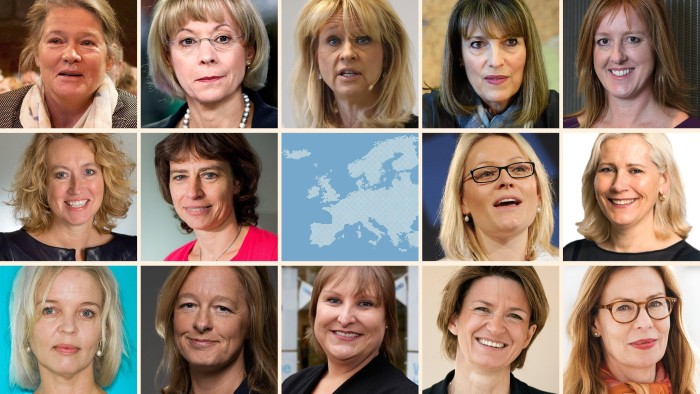Woman as pick to lead GSK bucks UK trend

Roula Khalaf, Editor of the FT, selects her favourite stories in this weekly newsletter.
Emma Walmsley’s appointment last week as chief executive and director at GlaxoSmithKline, the pharmaceuticals company, comes despite the falling rate at which women are moving on to the boards of Britain’s biggest listed companies.
Since last year, when the UK hit its voluntary target that a quarter of the board seats at its 100 biggest listed companies be occupied by women, the trend has reversed. More women are leaving boards than joining them.
Just six other FTSE 100 companies are run by women. Ms Walmsley, who spent 17 years and rose to executive level at French cosmetic group L’Oréal, is soon to become the first female leader of a global pharmaceutical group. She runs GSK’s consumer division and takes up her new position in March.

Perilous times lie in wait for those who take the helm
When all else fails, the call goes out for a woman to lead
‘Brutal advice’ has its reward
Leyla Boulton catches up with a finance professional and a chairman who were paired in a UK scheme
Online course helps women find sponsors
Aim is to help overlooked staff find senior advocates to diversify top ranks
Diversity needs skilled leaders
Mixed groups with conflicting views require more active and sensitive managers to run them
Close the gender gap to boost output
Narrowing the gender divide offers economic gains as well as societal benefits
Essay winner: Diversity benefits companies
Despite slow progress, women will exert their influence over the coming decade, writes Ivana Vasic Chalmers
Ms Walmsley’s appointment is also something of an exception in that she will be joining a UK board as an executive, rather than a non-executive director. UK companies hit their target in 2015 largely by picking women to become independent directors, making them potentially less influential than had they come up through the executive ranks like Ms Walmsley.
Different countries have pursued different routes in their attempts to move more women into the boardroom, all of which have attracted controversy. The UK provides a salutary example of the advantages and pitfalls of voluntary gender targets.
The government imposed the voluntary target on the country’s largest listed companies in 2011, aiming to double female board representation from 12.5-25 per cent in four years. By last year, women occupied 26 per cent of those companies’ board seats.
A range of evidence suggested that one of the reasons the target was met was that companies preferred a voluntary goal to having legislation imposed on them.
The threat of mandatory quotas if the voluntary drive did not work was, nonetheless, a credible one and backed by the UK’s coalition government of the day. Progress was publicly monitored.
Despite its success in boosting the number of women who became non-executive directors, the effort failed to affect significantly the number of female senior executives. Research published in May showed that women represented a sixth of senior executives at the UK’s largest 350 listed companies.
A new goal was announced in October last year. This time the top 350 listed companies were to aim to have women in a third of the seats on their boards by 2020.
Since last year, progress has stalled and in some respects reversed. In February, GSK’s chairman, Sir Philip Hampton, took over the panel that monitors companies’ progress. The first research released under his watch showed that female representation on the boards of the FTSE 100 had remained stagnant at 26 per cent. Meanwhile, the replacement rate for women on boards had turned negative and fewer than a quarter of board appointments between September and March were women. This was the lowest figure since 2011.
Sir Philip surely had his eye on Ms Walmsley as a potential candidate to join him on the GSK board when he accepted the task of keeping other companies on track. Other chairmen will be able to follow his example, however, only if companies advance women’s careers through the executive ranks, just as L’Oréal did during Ms Walmsley’s international career there.
Comments